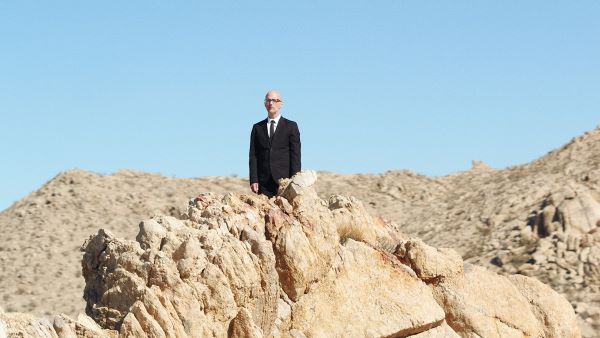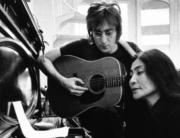
Moby is probably the most self-aware narcissist you will ever meet. In Moby Doc, directed by Rob Gordon Bralver, he comes across as self-deprecating and piercingly intelligent, with clever asides and a certain deadpan flair. He understands how narcissistic it is for a narcissist to appear in a documentary about his own narcissism. Yet he feels he has a lesson to impart for those who think that if they have money and recognition, they would find happiness. But in Moby’s experience, that has “never been the case for anyone.”
Narrating his life’s story, Moby begins with a description of his upbringing, complete with handmade puppets, chess-like figures representing his parents, and scenes performed by “The Childhood Trauma Reenactment Players.” Indeed, his early years were especially grim. His parents were New York City bohemians and very young. Once Moby was born, they got to fighting, the father began drinking and died in a drunk-driving accident. After that, his mom moved to “the sad suburban world” of Darien, a very well-off Connecticut suburb, where Moby felt like the poorest kid around and neglected by an indifferent mother.
The only time he felt safe was with the family pets, which nurtured a lifelong passion for animals because, “Animals are nice, and people are terrifying.” Along came punk rock, and he turned to music. This offered him a refuge because, within his group of misfit punks, music became a place to “take the fear and confusion and make it interesting.”
As you can see, Moby is eminently quotable. He’s smart and percipient. He is also pretentious and that certainly comes across here. There are odd drone shots of Moby walking in a mountainous desert, and a black-robed figure of death makes an appearance or two. Or, as Moby sits on a hotel bed, what looks like swirls of black ink fade in and out behind him. These images serve somewhat as interstitials, but they don’t wash off the film’s sense of self-satisfaction. Despite the unconventional, sometimes surreal visual flourishes, his bio still hews very closely to the Behind the Music trajectory.
However, one thing that can’t be sloughed off is the music. What makes his output compelling is his ability to combine stately electronic music with a certain majesty, and the score he wrote for this film is among his most soaring. We also get snippets of a concert he performed with a full orchestra. It is fairly astonishing, particularly a ravishing, deeply emotion rendition of “Natural Blues”
Eventually, as mentioned earlier, we get the usual music bio doc shenanigans. Moby goes broke, a hit single suddenly makes him rich, he goes broke again, an album becomes an international blockbuster, he becomes complacent, he drinks…. a lot, then he becomes a self-described “rock ‘n’ roll “cliché” and has to break through the other side.
Luckily for us, the other side isn’t some attempt at new-agey or overly psychological self-awareness (Moby already has provided that) but a recommitment to animal rights and the promoting of veganism, ending the documentary on a call-to-action note.
















Leave A Comment